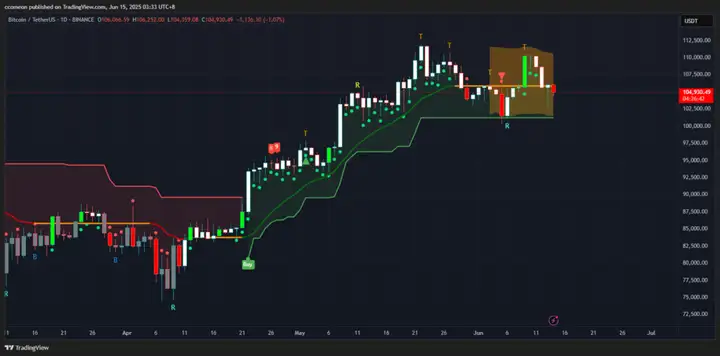The resurgence of conflict between Israel and Iran caused the cryptocurrency market to retreat from its highs near the weekend, erasing the gains from the previous week driven by good US economic data. Although the Sino-US trade negotiations at the beginning of last week had not yet concluded, they initially reached an agreement, with both sides principally agreeing to open trade, with only details left to be finalized. Therefore, the market sentiment at the beginning of the week was optimistic, and Bitcoin rose above $110,000, waiting for the CPI results on Wednesday to see if it could challenge new highs.
VX:TZ7971
On Wednesday, the CPI was published with a lower-than-expected figure, and on Thursday, the PPI and unemployment data also showed that US inflation had not worsened as expected, while the job market was beginning to slow down. These were entirely favorable data for potential interest rate cuts, so the market anticipated a potential rate cut as early as September, stimulating the market to maintain high-level oscillations.
Unfortunately, the good times did not last long. In the early hours of Wednesday, news of tensions in the Middle East emerged, and by Friday, war broke out, causing the market to fall into a downturn. Interestingly, observing Bitcoin's daily trend, the decline caused by the war between Israel and Iran was not as severe as the serious fallout between Trump and DeSantis the previous week, and Bitcoin at least did not challenge the important $100,000 mark again.

Focus on Powell's Speech at Thursday's Monetary Policy Meeting
This week, the market is expected to continue to be affected by the Middle East situation, with potential market fluctuations depending on whether other countries, especially the United States, will actively intervene. Of course, the biggest black swan would be if Iran actually produces and uses nuclear weapons, but this probability is quite low.
Conversely, if both sides "stop at the point of contact" as in previous conflicts, and Trump then drives bilateral talks, the market's gloom will dissipate. In the past, after such conflicts, there has usually been a significant rally, and Bitcoin would have a good chance of returning to $110,000.
Setting aside the Middle East issue, the US will publish retail sales data on Tuesday, unemployment numbers on Wednesday, and then the Federal Reserve's monetary policy meeting results on Thursday morning. Currently, the market expects interest rates to remain unchanged, so everyone is waiting for Powell's speech at the press conference.
Based on last week's economic data, inflation is not expected to worsen with tariffs. Everyone is watching whether Powell will soften his stance on maintaining interest rates and whether he will hint at when rate cuts might begin. If his remarks are dovish, the market will tend to be optimistic, but currently, the market expects him to maintain a stance of keeping rates unchanged in the short term.
Today's fear index is 60, still in a state of greed.
With no market movement, weekend liquidity is already low, and with the hanging negative factors, most funds are in a wait-and-see state. The good news is that despite the escalating Israel-Iran conflict, the market has not continued to decline, and Bitcoin has seen ETF fund inflows for five consecutive days. In the long run, geopolitics is not the most important factor for Bitcoin; the US Dollar Index (DXY) is. The dollar index just fell below 100, reaching its lowest level in over three years. Clearly, the US dollar is declining, and Bitcoin's trend is usually the opposite. Since negative factors cannot push the market down, there will likely be a retaliatory rebound when these factors ease, so it's advisable to hold coins and wait patiently.





